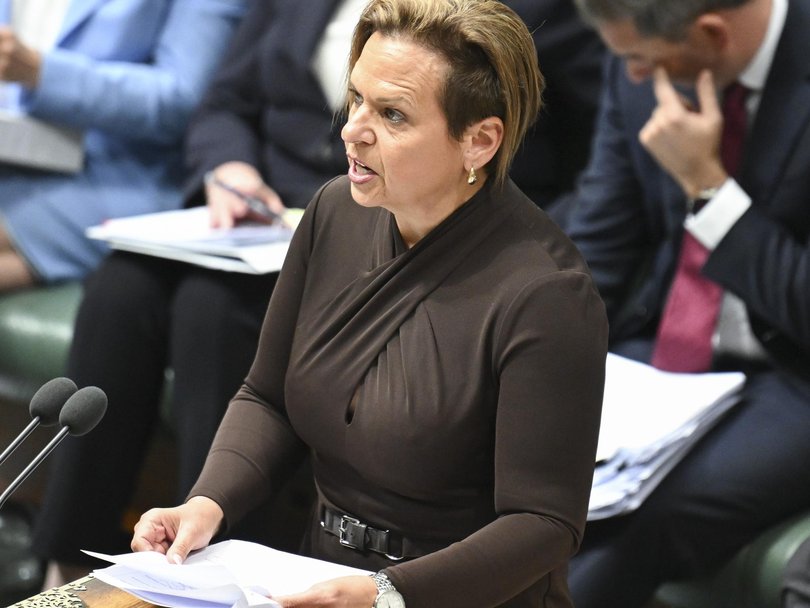Labor’s blame of ‘AI bots, foreign actors, criminal gangs’ for FOI attack questioned amid a lack of proof
Government agencies fail to provide proof to back Labor’s claim they’re tightening freedom of information laws because “AI bots” and “foreign actors” are swamping the FOI system.

Labor’s claim they’re tightening freedom of information laws due to “AI bots” and “foreign actors” swamping the FOI system has been scrutinised after key Government agencies could not produce proof of such cases.
The Government’s reforms to the FOI Act announced last month would create new fees and time restraints for applications — making it harder for Australians to assess information.
Changes also aim to expand disclosure exemptions for Anthony Albanese’s Cabinet, allowing him to hide material relating to deliberations.
Sign up to The Nightly's newsletters.
Get the first look at the digital newspaper, curated daily stories and breaking headlines delivered to your inbox.
By continuing you agree to our Terms and Privacy Policy.Attorney-General Michelle Rowland and her federal Labor colleagues have rolled out a list of excuses for the new FOI regime, including blaming bots, foreign players, and even criminal gangs.
“Many of them we’re sure are AI-bot generated requests. They may be linked to foreign actors, foreign powers, criminal gangs,” Senior Labor Minister Mark Butler told reporters on September 2.

However, when key Government departments appeared before a Senate inquiry into the reform on Friday, they could not provide evidence that had occurred. They even admitted such data wasn’t captured.
“Unfortunately, I can’t give you a statistic on how many might be generated by AI or a ‘bot’, it’s just not something that our system collects,” Home Affairs top official Brooke Hartigan said.
“We don’t necessarily have evidence of that actually occurring in the Department.
“You’re correct to say that we don’t have any numbers of our system being approached by bots.”
When then asked if Home Affairs had given the advice relating to “foreign actors” trying to tap into data via FOI, Ms Hartigan could not answer — instead, taking the question it on notice.
Services Australia’s witness Robert Higgins echoed Ms Hartigan evidence, telling the inquiry he was “unaware” of if hostile foreign groups or criminal gangs had tried to use FOI laws.
“I couldn’t provide any detail on that,” Mr Higgins said.
It came after Cameron Gifford, the chief operating officer for Ms Rowland’s department, had also admitted in a Senate inquiry last week he too had “no knowledge” of any such cases.
Despite Ms Rowland’s commitment to the amendments, it’s unlikely to pass Senate as Coalition, Greens and key crossbenchers have all voiced outrage.
Opposition Leader Sussan Ley has declared Coalition would “stand firmly against these changes”, with her colleague Julian Leeser previously labelling the proposal a “truth tax”.
Greens Senator David Shoebridge questioned why “CAPTCHA” technology — which creates small challenges to test if users are human rather than a bot — wasn’t used for online FOI applications to government departments.

“I don’t think it would be revolutionary to put in place a CAPTCHA provision on a department’s website,” Senator Shoebridge said.
“Have you considered doing that off-the-shelf technology to protect the department from bots?”
Ms Hartigan responded to say Home Affairs had a procurement process underway for a new FOI management system.
Her colleague Carmen Saunders then chimed in to remind Senator Shoebridge FOI applications weren’t just lodged via an online form.
“The other point to add Senator, is that we have multiple avenues... Mail, email, or via an online form,” Ms Saunders said.
Senator Shoebridge sarcastically hit back at the excuse: “I don’t think AI bots are going to be putting it in snail mail though, are they? That’s an unlikely problem. Unless you’re aware of some mailing AI bot, that I’m not aware of?”
Stopping bad actors wasn’t the only excuse used in the inquiry. Several government officials had also blamed “abuse” by applicants as a reason for the changes.
Services Australia custom services general manager Jodie Robison raised that FOI officials had been targeted with harassment by vexatious applicants, of which a number had involved the engagement of police officials.
“We have active cases underway. I don’t have the numbers here. That’s often a combination of behaviour of harassment of our staff,” Ms Robison claimed.
However, when asked — Ms Robison couldn’t list the number of police referrals, prosecutions, or provide cases studies.
Senator Shoebridge criticised the Department’s ill-preparedness at the inquiry in failing to provide evidence to support Ms Robison’s “broad statements”.
It prompted Labor’s Senator Dorinda Cox to call a point of order and accused Senator Shoebridge of “badgering” officials with intentional statements to clip up and share on his personal social media accounts.
Australian Public Service Commission’s Deputy commissioner Dr Rachel Bacon had also claimed the current FOI settings allowing anonymous FOI applicants only “emboldened” people to “exacerbate” abuse officials.
Dr Bacon went on to highlight the Royal Commissions into the Home Insulation Program and Robodebt in her testimony as examples of why FOIs access needed to be restricted.
Dr Bacon claimed the Robodebt inquiry had revealed that under the current FOI laws public servants weren’t as forthcoming to put “frank and fearless advice” to Ministers and Government in writing.
Senator Shoebridge again slammed the excuse and questioned the department’s interpretation of the findings in the Royal Comissions.
“This seems like a deep culture problem that’s happened on your watch,” Senator Shoebridge said.
“You’re meant to be setting standards and maintaining standards, and yet you come to this committee, and you say ‘well, public servants are not doing what they should’.
“They’re not providing frank and fearless advice in writing.
“They’re relying on Post-It notes, Signal and WhatsApp — that seems, to me, a culture problem that you’re highlighting and contrary to their legal obligations.”
Several other witnesses told the inquiry while it was agreed the 1982 FOI Act needed to be updated, Labor’s current approach was one-sided and benefited government secrecy over transparency.
The Australia Institute’s Skye Predavec said while it was true the “FOI system is broke” and needed to be modernised, the government was wrongly justifying the changes.
“This bill doesn’t seek to address those problems, which are mainly cultural and come from the top, down,” she said.
“Government secrecy is the main cause of problems in the FOI system, not the applicants who would be penalised and further restricted under these changes.”
Transparency International Australia’s Hansika Bhagani said Cabinet-in-confidence exemptions were “already overused” and FOI laws were an importance “anti-corruption tool”.
Ms Bhagani raised the move by New Zealand in 2018 to make a commitment to proactively releasing materials as an example of another avenue the government could have taken in their reforms, which she said could increase transparency and decrease FOI burden.
“International practice shows this works — ministerial diaries disclosure can reduce FOI demand, and it builds trust,” she said.
